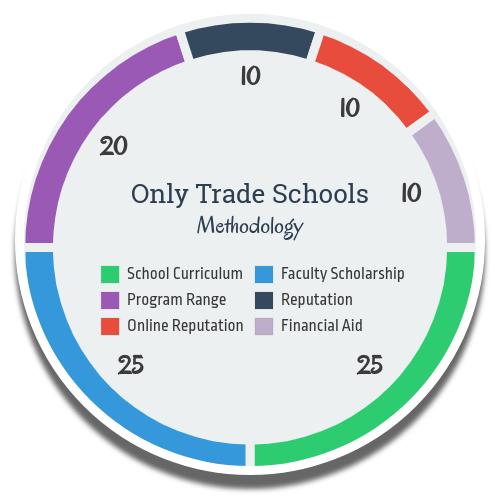OnlyTradeSchools.com is helping students ensure they find the best school for them and there are several ways used to do so.
List of ranking values of schools with training programs is all for getting methodological assessment sound for every program/school’s characteristics, mostly for how they can be measured objectively.

Schools are complex entities which have several factors which can be considered.
When these are to be filtered towards where there are meaningful comparisons which are formed for a defensible ranking list which becomes an art and science.
The challenge can be met when there can be insightful and useful rankings education-wise.
We hence formulate the rankings according to five informative categories.
The main qualities and metrics which are ranked are, weights listed, detailed considerations, and expand the considerations.
1. School Curriculum [Weighs 25%]
- Weight the schools as per the leading famous schools in the same discipline.
- Weighing the curriculum of schools against known major employers knowledge needs in the same discipline.
- Weighing core curricula activities that are advanced courses in the same discipline, and then compare them against the introductory courses.
- It considers the elective ranges in the same discipline.
- Considers the faculty expertise in the same discipline.
- Considers the specialization types and numbers which are offered in the same discipline.
- Considers online environment quality offered to the students if any, in the same discipline.
2. Faculty Scholarship [Weighs 25%]
- Considers the faculty’s educational background.
- Consider the years of experience in the faculty both in and out of academia.
- Consider faculty leadership and membership in the relevant and prominent associations.
- Consider all the academia papers which the faculty publishes in the prominent and relevant periodicals.
- Consider the recognition and awards which are given to the faculty members all from several sources and prominent organizations.
3. Program Range [Weighs 20%]
- Considers the degree level range which includes; professional, doctoral, masters, bachelors, and associates.
- Considers the subjects which are offered in degree programs like technology and computers, art and design, criminal justice, business, and education and teaching.
4. Reputation [Weighs 10%]
Considers the reputation of schools on academic employers and peers which includes:
- Curriculum
- Faculty
- Graduates suitability in the workplace
- The adaptability of employment sectors
- Academic knowledge freshness
5. Online Reputation [Weighs 10%]
Considers user reviews on top social ranking platforms which include the following:
- Yelp
- Trustpilot
- Great! Schools
6. Financial Aid [Weighs 10%]
- There must be full accreditation for the agency which is endorsed from U.S Educational Department then listed onto the federal register so it can accept federal financial aid of the students.
- It also considers the school range of sponsored financial aid like the grants and scholarships.
If you have any questions regarding our methodology, don’t hesitate to contact us.





